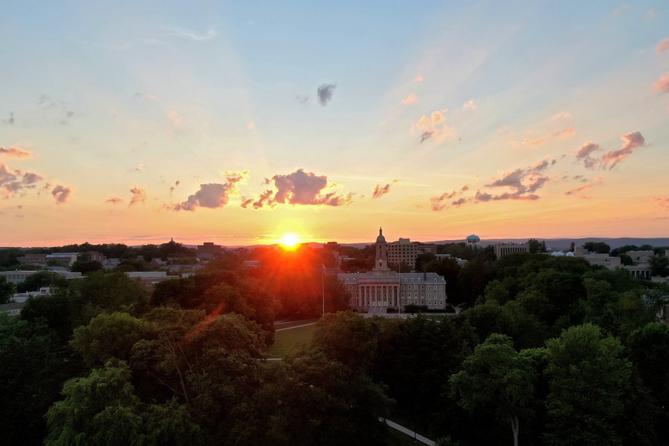Penn State University’s Board of Trustees will complete a training on the state’s open meetings law and disclose more information about its closed-door gatherings as part of a settlement with Spotlight PA.
The agreement, signed last week, ends a case the newsroom, in partnership with the Reporters Committee for Freedom of the Press, brought against the board in December 2023 for alleged violations of the Sunshine Act, the state law mandating transparency from governing bodies.
“The settlement ensures that one of Pennsylvania’s most influential institutions will conduct its business with the transparency that taxpayers, students, faculty, and staff deserve,” said Christopher Baxter, CEO and president of Spotlight PA. “The university’s most recent decision to close seven campuses — and the effect it will have on communities across the state — underscores the need for these important reforms.”
Neither Penn State nor board leadership responded to a request for comment for this story.
Spotlight PA has documented the board’s decadelong use of private meetings and practices that may have run afoul of the state’s transparency law, including that university leadership met privately with trustees to discuss Penn State’s multimillion-dollar budget deficit and to consider naming the football field after former coach Joe Paterno. Internal board communications, previously obtained by the newsroom, revealed that board leadership directed trustees to ask questions during a private session rather than at a public meeting, a request a media law attorney described as a “gigantic red flag.”
Penn State has already altered some of its practices to increase transparency. In October, a committee of top university officials held its first public meeting since 2011. Under the new settlement agreement, every meeting of the executive committee must be publicized on the board’s website, and the board must continue to publish the group’s meeting agendas.
Additionally, according to the settlement, the board will hold a Sunshine Act training for trustees and publicly report which members completed the session. The Pennsylvania Office of Open Records is scheduled to provide the training on Sept. 11, according to the agency’s calendar. Incoming trustees will be offered the training starting in 2026.
Liz Wagenseller, executive director of the Office of Open Records, said in a statement that the state’s open meetings law “plays a vital role in ensuring the public can see how tax dollars are spent and how government entities operate. The Office of Open Records values every invitation to assist agencies and others subject to the law in better understanding their obligations regarding public meetings. We look forward to working with the Penn State Board of Trustees to help uphold the transparency and accountability the Act is designed to promote.”
For years, the Penn State board has met behind closed doors with university officials in “conference,” a practice allowed under the law for “any training program or seminar, or any session arranged by State or Federal agencies for local agencies, organized and conducted for the sole purpose of providing information to agency members on matters directly related to their official responsibilities.” The public had limited insight into these gatherings.
Under the agreement, the board will disclose the person providing the training and the topic. Similarly, when the trustees hold an executive session, the board will publicly say the reason why and cite the legal exemption that allows for the private meeting. The terms of the settlement will last for five years. Read the full agreement here.
“This is such an important win for transparency in the Commonwealth,” said Paula Knudsen Burke, the Pennsylvania attorney for the Reporters Committee for Freedom of the Press who represented Spotlight PA in the case. “The university and its board of trustees are ultimately accountable to the people of Pennsylvania, and their business is the public’s business. This agreement, which explicitly includes Sunshine Act compliance training, sets a clear expectation that they can no longer hide behind closed doors and executive sessions.”
The settlement ends more than 18 months of legal arguments in local court.
In October 2023, Spotlight PA and the Reporters Committee for Freedom of the Press sent the board a letter requesting the trustees “immediately cease holding improper executive sessions and conferences, advertise and record meeting minutes for all public meetings, and halt the practice of deliberating in secret.”
The university’s vice president and general counsel, Tabitha Oman, responded that she was “confident that the Board has taken its official actions and conducted its deliberations in compliance” with the law.
During the board’s November 2023 meetings in University Park, Spotlight PA witnessed what it believed were potential violations of the open meetings law, prompting the lawsuit in Centre County Court of Common Pleas. After the board’s February and May 2024 meetings, the lawsuit was amended to include additional allegations. Throughout the legal process, Penn State argued its trustees followed the law.
“Penn State is a more transparent institution than it was a year and a half ago thanks to Spotlight PA and the Reporters Committee for Freedom of the Press,” said Sarah Rafacz, managing editor of Spotlight PA’s State College bureau. “With this agreement in place, we will see more public disclosures about the business of the trustees than ever before. Our push for transparency will also continue through our tenacious accountability reporting on the university.”
In September, Commonwealth Court will tentatively hear arguments in an ongoing case between Penn State and the state Department of Education against Spotlight PA to decide whether university documents the Office of Open Records previously deemed public should be turned over to the newsroom.
